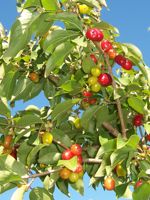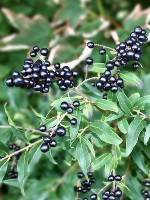Mon-Fri 9am - 5pm Mountain time
Cornelian Cherry Dogwood vs Wild Privet
Cornus mas
Ligustrum vulgare
NOT AVAILABLE THIS SEASON - MIGHT RETURN
NOT AVAILABLE THIS SEASON - MIGHT RETURN
Cornelian Cherry Dogwood is an ornamental plant with a variety of uses as it can be grown as a shrub, small tree, hedge, or privacy screen. The bright yellow flowers grow in clusters and bloom in late winter to early spring, providing an early food source for pollinators. They are visually striking as the flowers bloom before the leaves appear and last for several weeks.
Red, cherry-like fruits are produced in midsummer. They are edible but are better suited for preserves and syrups as the taste is fairly sour and astringent, similar to that of sour cherries and cranberries.
The Cornelian Cherry Dogwood was the winner of the Gold Medal Award from The Pennsylvania Horticultural Society as well as the Cary Award for having superior landscape appeal and for being winter hardy and pest resistant.
Wild Privet is a fast growing ornamental shrub that is well suited for forming hedges and privacy screens. It will retain its leaves in warmer climates but drops them in colder areas. They have small white flowers, though the smell is often considered unpleasant. While the berries are inedible, they are a good food source for many bird species.
It is recommended to prune Wild Privet immediately after flowering, as it can readily self seed. It is deer and rabbit tolerant. It can grow in dry areas, on slopes, and withstand the wind making it well suited for many growing conditions.
Cornelian Cherry Dogwood Quick Facts
Wild Privet Quick Facts
Toxicity: If ingested, all parts of this plant will cause severe discomfort. Toxic to dogs, cats, and horses

